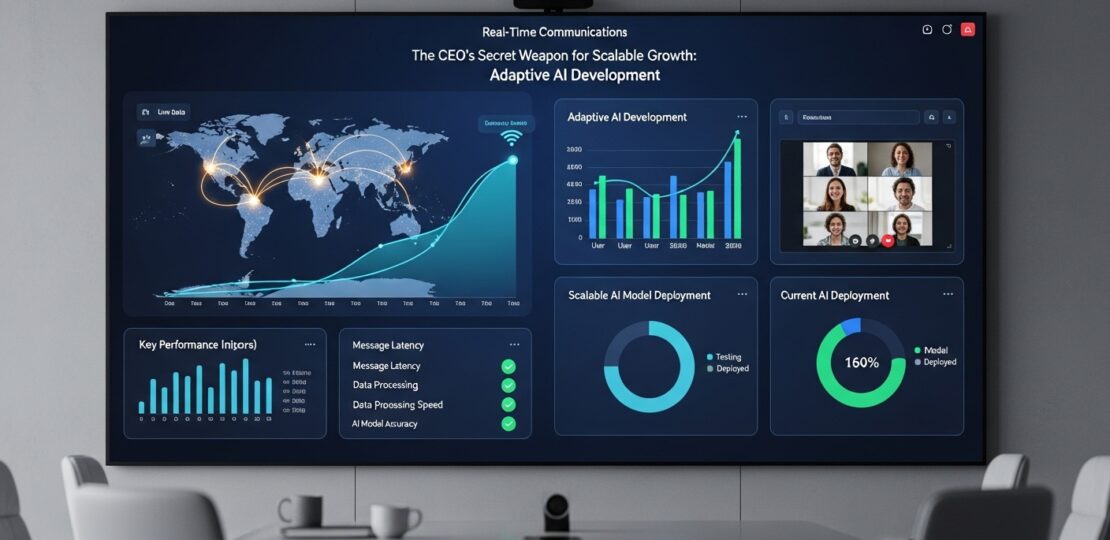The CEO’s Secret Weapon for Scalable Growth: Adaptive AI Development
October 10, 2025 | by IoT Development Company

Introduction
Scaling a business is no small feat. CEOs face constant pressure to grow revenue, optimize operations, enhance customer experiences, and stay ahead of competitors. Traditional growth strategies—relying on intuition, historical data, and incremental improvements—often fail to keep pace with rapidly changing markets and customer expectations.
Enter adaptive AI development. By leveraging intelligent systems that continuously learn, predict trends, and automate key processes, CEOs can unlock scalable growth opportunities. Adaptive AI enables businesses to operate more efficiently, engage customers more effectively, and make faster, data-driven decisions. Companies partnering with an adaptive AI development company or adopting adaptive AI development services are finding that they can accelerate growth without exponentially increasing costs or resources.
This article explores how CEOs are using adaptive AI, the benefits it provides, key features, implementation strategies, challenges solved, best practices, and future trends shaping scalable growth.
What is Adaptive AI Development?
Small Introduction
Adaptive AI development refers to creating AI systems that continuously learn from data, interactions, and changing conditions to improve business performance over time. Unlike static automation tools, adaptive AI evolves with your business, optimizing processes, predicting trends, and personalizing customer experiences dynamically.
How It Works
- Data Aggregation: Collects and consolidates internal and external data from sales, marketing, operations, and customer interactions.
- Predictive Analytics: Forecasts demand, customer behavior, and market trends to inform strategic decisions.
- Automation of Processes: Handles repetitive, high-volume tasks efficiently, freeing teams for high-value work.
- Continuous Learning: AI adapts models and strategies based on outcomes, feedback, and new data.
Key Features
- Intelligent Decision Support: Provides actionable insights to guide strategic initiatives.
- Customer Behavior Prediction: Anticipates needs, preferences, and churn risk.
- Operational Optimization: Suggests resource allocation, supply chain adjustments, and efficiency improvements.
- Personalized Engagement: Delivers tailored experiences at scale across multiple channels.
- Seamless Integration: Connects with ERP, CRM, marketing, and analytics tools for holistic insight.
How CEOs Use Adaptive AI for Scalable Growth
1. Accelerating Revenue Growth
Adaptive AI identifies high-value opportunities in customer segments, markets, and products. Predictive lead scoring and automated engagement ensure that sales teams focus on prospects most likely to convert, shortening sales cycles and increasing revenue.
2. Optimizing Operational Efficiency
By analyzing operational data in real-time, adaptive AI detects inefficiencies, bottlenecks, and cost-saving opportunities. This allows CEOs to scale operations without proportionally increasing expenses or complexity.
3. Enhancing Customer Experience
AI predicts customer preferences and personalizes interactions across digital platforms, ensuring engagement, loyalty, and retention. Positive customer experiences translate into repeat business and higher lifetime value, driving sustainable growth.
4. Strategic Decision-Making
Adaptive AI provides predictive analytics and scenario simulations, enabling CEOs to make data-driven decisions about investments, market expansion, and product development. This reduces uncertainty and accelerates strategic execution.
5. Workforce Scalability
AI automates routine tasks, freeing employees to focus on higher-impact work. This allows organizations to scale operations and customer-facing activities without proportionally increasing headcount.
Benefits of Adaptive AI Development Solutions
- Scalable Growth: Accelerates revenue and operational expansion without linear increases in cost or resources.
- Faster Decision Cycles: Real-time insights enable rapid strategy adjustments.
- Data-Driven Confidence: Reduces reliance on intuition, minimizing risk.
- Enhanced Customer Retention: Personalized engagement improves satisfaction and loyalty.
- Operational Excellence: Optimizes resources, processes, and workforce allocation.
- Competitive Advantage: Early adoption of adaptive AI enables CEOs to outperform competitors.
Case studies show that companies implementing adaptive AI development services experience up to 30% faster revenue growth and improved operational efficiency.
Key Features of Adaptive AI Development Solutions
- Behavioral Analytics: Tracks customer and operational patterns to inform decisions.
- Predictive Forecasting: Anticipates market shifts, demand trends, and customer behavior.
- Automated Workflows: Streamlines repetitive tasks across departments.
- Real-Time Dashboards: Provides executives with actionable insights at a glance.
- Integration Capabilities: Connects with existing business systems for seamless data flow.
- Continuous Learning Algorithms: Refines models based on outcomes and changing market conditions.
Challenges Adaptive AI Solves
- Slow Growth: AI identifies revenue opportunities faster than traditional methods.
- Operational Inefficiencies: Detects and optimizes bottlenecks to scale effectively.
- Customer Churn: Predicts and prevents disengagement through proactive engagement.
- Data Overload: Consolidates complex datasets into actionable insights.
- Resource Constraints: Automates tasks to maximize output without expanding headcount.
By solving these challenges, adaptive AI enables CEOs to focus on strategy, innovation, and high-impact decision-making.
How to Implement Adaptive AI
- Define Growth Objectives: Identify key metrics such as revenue targets, customer retention, and operational KPIs.
- Engage an Adaptive AI Development Company: Partner with experts to create tailored solutions.
- Integrate with Existing Systems: Ensure seamless connection with CRM, ERP, and analytics platforms.
- Train AI Models: Use historical and real-time data to optimize predictive accuracy.
- Monitor Performance: Track KPIs to measure impact on revenue, efficiency, and customer experience.
- Iterate Continuously: Refine AI models as business conditions and markets evolve.
- Ensure Human Oversight: Combine AI insights with executive judgment for strategic decisions.
Industries Benefiting from Adaptive AI
- Technology and SaaS: Predictive sales, automated onboarding, and personalized user experiences.
- Retail and E-commerce: Demand forecasting, dynamic pricing, and targeted engagement.
- Finance and Banking: Risk analysis, investment recommendations, and customer insights.
- Healthcare and Pharmaceuticals: Patient engagement, operational optimization, and regulatory compliance.
- Manufacturing and Logistics: Supply chain optimization, inventory management, and predictive maintenance.
Adaptive AI development solutions can be customized to meet the unique growth needs of any industry, ensuring relevance and scalability.
Best Practices for CEOs
- Start with High-Impact Areas: Focus AI on areas that drive the most growth.
- Ensure Data Quality: Reliable insights require accurate, clean, and comprehensive data.
- Combine AI with Human Expertise: Use AI to inform decisions, not replace judgment.
- Track KPIs Continuously: Monitor outcomes to refine AI models and strategies.
- Foster a Culture of Data-Driven Decisions: Encourage teams to adopt AI insights in day-to-day operations.
- Plan for Scalability: Design AI systems that grow with your business needs.
Future Trends in Adaptive AI Development
- Hyper-Personalization at Scale: Tailored experiences for millions of customers simultaneously.
- Predictive Market Intelligence: AI identifies emerging opportunities and threats before they become apparent.
- Cross-Functional Integration: AI connects insights across sales, marketing, operations, and finance.
- Explainable AI for CEOs: Transparent decision-making insights to support strategic planning.
- Proactive Growth Recommendations: AI not only identifies problems but suggests initiatives to drive scalable growth.
These trends demonstrate that adaptive AI solution development is not just a tool—it is a strategic enabler of long-term, sustainable growth.
Conclusion
For CEOs, adaptive AI development is a secret weapon for achieving scalable growth. By combining predictive analytics, automated processes, real-time insights, and continuous learning, businesses can accelerate revenue, optimize operations, and enhance customer experiences. Companies leveraging adaptive AI development services or partnering with an adaptive AI development company gain a significant competitive advantage, enabling executives to focus on strategy and innovation rather than manual processes.
In today’s fast-paced, data-driven world, CEOs who embrace adaptive AI are not just surviving—they are thriving, unlocking opportunities for growth that would be impossible with traditional methods. Adaptive AI solution development is the future of scalable, intelligent, and sustainable business expansion.
RELATED POSTS
View all



